America's Portfolio Rebalanced
Trump is load-shedding liabilities across the Eastern Hemisphere while eyeing acquisitions across the Western Hemisphere
Donald Trump is a developer and builder. He sees the world in terms of assets and liabilities.
As POTUS, he seeks — very much like a first-term Nixon who opened up China to leverage Russia — freedom of action (his tactic being the reverse). He feels hemmed in, regarding what he wants to accomplish (making America great again in a very turn of the 20th century manner), by a series of inherited obligations and antagonistic superpower relations that he is determined to eliminate. The freedom of action he seeks involves the Western Hemisphere and not the Eastern Hemisphere, thus he seems at once isolationist and expansionistic — again, very turn of the 20th century America.
To accomplish his dreams, Trump must rebalance America’s global portfolio, discarding liabilities in the East so he can acquire and develop new assets in the West. In both endeavors, he applies all the tricks of his personal trade/brand. It is a bullying approach full of name calling and baseless accusations — all designed to signal his firm intent to dump and snatch in a series of bold maneuvers.
My first-cut attempt to explain this logic was the piece I penned for Politico in January:
My Politico Magazine "Big Idea" essay
"An Expert in Grand Strategy Thinks Trump Is on to Something" by Thomas P.M. Barnett
When it came time for me to once again teach at Syracuse U’s Maxwell School (National Security Decision Making) on Monday — a regular gig for several years now, I felt a strong need to incorporate where I was going on Trump into my usual ANM-based presentation.
In delivering that updated message, I confessed in class to being “scaroused” by Trump’s unfolding diplomatic blitzkrieg — a term I picked up from Futurama.
Scared and aroused.
Scared is easy enough to explain: Trump is trying to change virtually everything in America’s relationship with, and role within, the world order. That is supremely dangerous.
Aroused is more confessional: as someone who thinks in grand strategic terms, I’m watching Trump trying to change virtually everything in America’s relationship with, and role within, the world order. That is supremely exciting to me, I readily confess.
I am hardly the only person scaroused by Trump’s unprecedented tactics and vastly under-explained mission. His entire MAGA base is humming right now — admittedly oblivious to the dangers stoked, as are most of the independent voters who put him over the top (even as some of them understandably grow more concerned by the day).
Late last week I tried out this logic on a bunch of investors/board members of a particular company in my remote appearance at their annual meeting. The responses I got are the same ones I used to get all the time during my Pentagon’s New Map days in relation to the Bush Administration:
I think you’re over-estimating the vision thing with this administration; you’re making them sound a whole lot more coherent and strategic than they really are.
This makes a lot of sense, so why doesn’t the administration simply come out and talk like this, explaining itself?
In both instances, the “accusation” is the same: I’m making a silk purse out of a sow’s ear. And, if you disagree with the logic, then I’m an apologist for this “rogue regime” and its nefarious ways.
My comeback to such feedback is: This is what I’m supposed to do as a grand strategic thinker (admittedly self-appointed); I’m supposed to make sense out of the seeming chaos and contextualize it within a coherent higher-order vision/strategy.
You know the drill …
Asking me not to do that is asking me to not be me; in others words, this is how I cope, maintain my mental health, advance my professional analysis, sleep at night, and the like.
And yes, when push comes to shove, I am unabashedly and always pro-American, so I seek that happy ending, that progress, that way forward to something better — no matter who’s creating the momentum at the moment.
I choose not to apologize for that, or myself. This is my chosen/self-appointed profession of American grand strategist. I make that effort because I think it’s important (not self-important) and because — again — that’s just how my brain works.
America is my religion; I readily admit that.
Now, on to the slide and my most recent attempt (updated already from the version I gave at Syracuse two days ago) to explain Trump’s diplomatic blitzkrieg.
The new slide in the brief, parsed and re-colored (distinguishing “in the red” [liabilities] versus “in the black” [assets]), unfolds as follows:
For the purposes of this argument, I will divide the world simply between Western and Eastern Hemispheres. So, in ANM-speak, it’s the true West versus the combined Center and Asian slices (you know the image).
In my analysis, Trump’s view of the world is thus divided between a sense of over here (West Hem) and over there (East Hem). Stuff over here he naturally considers as available for acquisition in an overtly Manifest Destiny sort of way. Stuff over there he views mostly in terms of America’s outdated and obsolete obligations (liabilities) to the past (Why should we be involved in conflicts — ongoing or potential — that bring us nothing of immediate value and cost us plenty in blood and treasure?).
Trump essentially wishes to shed all such security obligations, picking them up only when they can be monetized (my military aid for your rare earths — the deal just struck with Ukraine).
So, that’s the basic view of the world from Trump’s golden tower: stuff I want versus stuff I want to get rid of or avoid as “losers,” “rip-offs,” etc.
The perfect example of this residual Cold War overhang: America’s worldwide military presence (120-ish true bases and hundreds more facilities). As I have noted here in the past: look at the big five powers (US, EU, Russia, India, China); we own 92% of the 800-plus overseas military facilities — a leftover model that no longer fits the new reality of a multipolar system within which it makes little sense for the US to always attempt to be the difference-maker in every conflict anywhere in the world.
Trump wants that obligation, that expectation, and those liabilities gone, gone, gone, so he can focus on what he sees as THE great threat of uncontrolled migrations (see, Vance’s lecture to Europe about accommodating right-wing thinking on that score). That is essentially a Western Hemisphere-defined problem-set requiring Western Hemisphere-centric solutions, ja?
That global US footprint was built sequentially: First holding off the Soviets in Europe (e.g., Marshall Plan); then, per the domino theory, dealing with Korea and Vietnam in Asia; and most recently, per the Carter Doctrine, assuming strategic ownership of the Persian Gulf due to its importance to the global economy. That how the pattern of US military crisis responses unfolded over the decades, yielding the current footprint that undergirds the Eurasian landmass pretty much everywhere — save India.
Does America need all this going forward in strategic competition with China?
Depends on how you define that competition, right?
Many experts see (and fantasize about) a poker-like showdown over Taiwan for all the chips — as if that would settle who “wins” once and for all (it wouldn’t).
I see America and China competing to integrate the Global South — with America naturally drawn to its historic role in the Americas and China already way ahead on both the Asian slice and Africa.
In Trump’s view, all these Eastern Hem obligations are weighing America down in unprofitable endeavors that do not add to our greatness.
So, he is working to whittle them all down to an acceptable modest size.
The reach-out to Russia (stunning reversal of fortune for Putin)
The rude-boy breakup with Europe (defend yourself, bitches!)
Providing top-cover to Israel and the Saudis to process what needs to be done in the Middle East
Some pressuring of India to contain China and rework bilateral trade (not really all that much of a priority, honestly)
A mega-deal in the works with China that probably involves massive Chinese investment in US production capacity as the price for continued trade (like Toyota and Honda becoming “American made” back in the day to end that trade fight).
Little to no interest in Africa writ large (enough with the working terrorism everywhere!).
All liabilities, all being reduced, with the strategic expectation that the world’s (and Eurasia’s) other four superpowers will manage their realms as need be.
Oh my God! What happens when one of those four rule the heartland and then the world island and then the world!!!!!!
Go change your pants right now! Before I send you back to MacKindergarten!
The goal? America gets out of the business of playing Leviathan to all in all tensions, makes nice with Moscow, gets real with Brussels, and cuts the grand bargain with China. Oh, and we backstop Israel’s takedown of Iran.
Hey! This is go-big and go home.
I have worked this ground before.
From my Wikipedia page:
Proposed China–US Grand Strategy Agreement
After joining the Center for America China Partnership in 2010,[11] Barnett and his two colleagues, John Milligan-Whyte and Dai Min, prepared the China US Grand Strategy Proposal between Presidents Hu and Obama.[12] The agreement received input from China's former Minister of Foreign Affairs, former UN Ambassador, former U.S. Ambassador, former Deputy Chief of the General Staff of the PLA, former Military Attaché to North Korea and Israel, former Vice Minister of Commerce, Central Party School Institute of International Strategic Studies, Chinese People’s Institute of Foreign Affairs, China Center for International Economic Exchanges, China Institute For International Strategic Studies, China Foundation for International & Strategic Studies, Boao Forum, State Council’s China Institute of Contemporary International Relations, and premier and state councilors.[13]
The agreement's provisions were introduced in Barnett's column in World Politics Review,[14] and in John Milligan-Whyte and Dai Min’s columns in People’s Daily Online in English[15] and in China Daily Online in Mandarin.[16] The text of the agreement itself appeared in the September/October 2011 edition of Foreign Affairs.[17]
Let’s the deal-making begin …
What can/must be accomplished to pull off this vast re-balancing?
First off and most obviously: end the war in Ukraine and get US military support paid for via mineral rights. As part of the process, get super-serious with Europe on paying for their own defense.
Second, while having already provided top-cover to Israel on their demolition and eradication of the Gaza Strip (Netanyahu now likes to cite the “Trump plan”), the Abraham Accords are still out there to be consummated — but at a steeper price, as far as the Saudis and Israelis are concerned: namely, the take down of the Islamic Republic of Iran.
I mean, let’s cut to the chase, right? Time’s a wasting.
With Russia suitable sidelined as part of its rehabilitation by Washington, Tehran is on its own and ripe for regime-crashing triggered by a serious Israeli military campaign (with Saudi and US military support) ostensibly to eliminate the nuclear threat once and for-all.
The ultimate goal? Ending the major security tensions of the region and putting the Saudis and Israelis in charge of regional security there, understanding that China and India grow more interested over time since it’s their oil that needs protecting. But the big point is, Trump seeking to rid America of the two reasons for instability-there-triggering-US-military-interventions: (1) Hamas (Axis of Resistance, in general) and (2) the Islamic Republic of Iran. Once both are effectively diminished as threat-vectors, the region can operate on its own well enough — under local strategic ownership, as it were.
As far as the world-is-on-fire crowd of hysterics are concerned, that’s two down and one to go.
And, yeah, here’s where Taiwan should be scared.
NYT: Taiwan Watches Trump Undercut Ukraine, Hoping It Won’t Be Next
I have proposed that trade many times over the past two decades (most notably in 2005’s Blueprint for Action), and I’m still willing to make that deal. Starting WWIII over Taiwan is nuts.
You eliminate those three conflicts/tension points and where do we suddenly find ourselves? We find ourselves with a “world island” lacking any great fights.
[sniff!] That’s no fun.
No, I haven’t forgotten North Korea. It just doesn’t really matter and can be finessed in any “grand bargain” between Trump and Xi. Eventually, the world will get around to ending that godawful regime, but there’s no hurry and no timeline of note. The regime is just a crazy relative you keep chained up in the basement.
This is one big load shedding by Trump: all three of the big Eurasian flashpoints dissolved in one massive release of US strategic obligations.
Trump most definitely gets his Nobel Peace Prize, having legitimately earned it.
Will America downsize its military then? Yes it will. But it will do so while transforming our military into a drone-defined force right out of Star Wars or the Matrix (or the most recent time Star Trek let the Enterprise go down in a movie). Our proving ground will be the Great Cartel Wars, as history later defines them.
That new strategic reality frees up America’s military and strategic attention to counter Chinese influence throughout the Western hemisphere (something Beijing accepts as part of the grand bargain over trade and Taiwan), befitting the serious hemispheric integration already rhetorically broached by Trump: Greenland, Canada, taking the fight to the drug cartels in Mexico, the Panama Canal … the whole Monroe Doctrine 2.0 vibe that recalls Rising America of the late 19th century — all the better for us to mirror-image China in a competition to woo, win over, and integrate emerging markets of the Global South, starting naturally in our own “backyard.”
Does any of this happen overnight? No.
Does it happen as a result of military interventions? In some situations south of the border … yeah, that will end up being part of the dynamic. But not up North.
This is the beginning of a long process. It’ll start with bold talk but eventually give way to bold deals. It will not be a one-president unfolding.
Can you imagine Trump celebrating our 250th birthday by debuting the new Old Glory with its 51st (Trump) star on the Fourth of July 2026?
I don’t know why but people keep calling it the Trump Star. It’s not my star and yet, I can see why they feel that way. I love the flag so much I wanted to give you a new one, so here it is. Call it the Trump Star if you must. I don’t mind. It’s a beautiful star, right? And there’s more to come!
Crazy right?
Remember, this was month one out of 48 for Trump 2.0. He’s just getting started.
So, yeah, we all better believe Trump has plans and ambitions and legacies to build, to include not just a better America but a bigger America. He is completely serious in this quest, and the stunning amount of load-shedding across the Eastern Hemisphere that he’s already set in motion in just that first of 48 months … that is some serious proof of intent.
America First becomes Americas First.
I vastly underestimated the potential for immediacy.
The right story is out there, awaiting our joint articulation. For now, it’s a one-way conversation — a harangue at best. That can and will change with the right deal-making.
Can Trump succeed?
He is certainly going to try — God help us all.




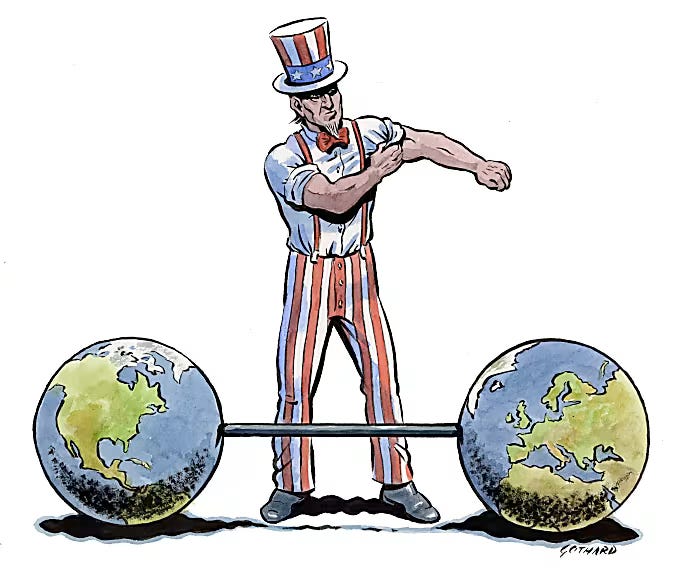
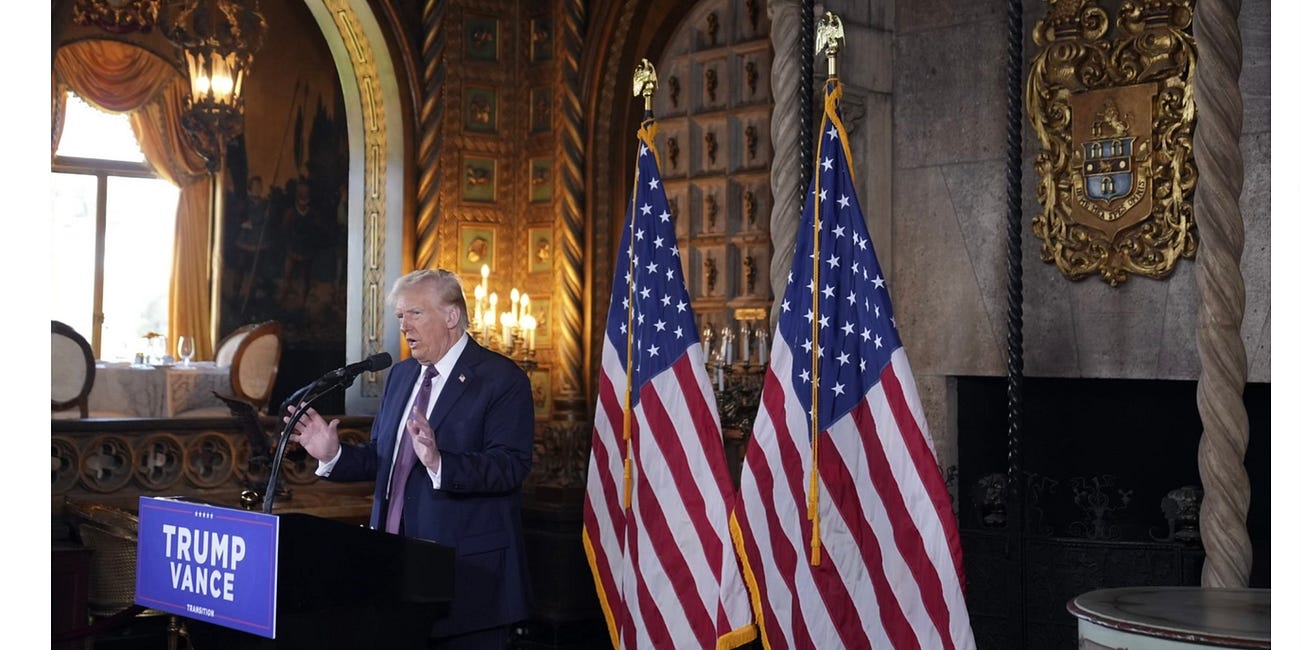
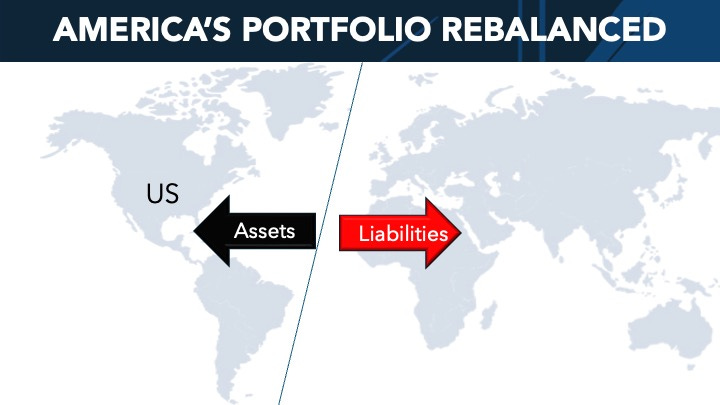
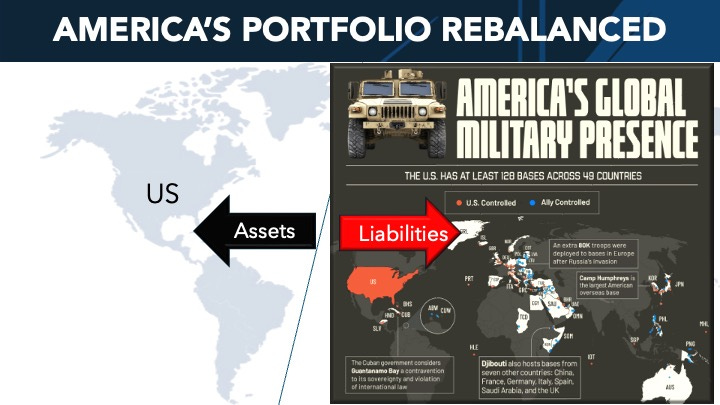
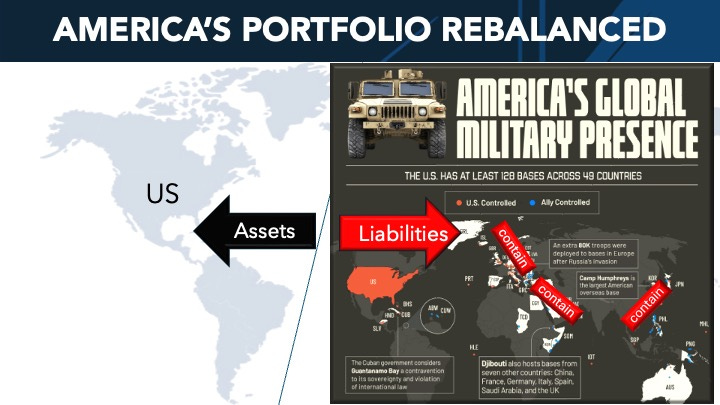
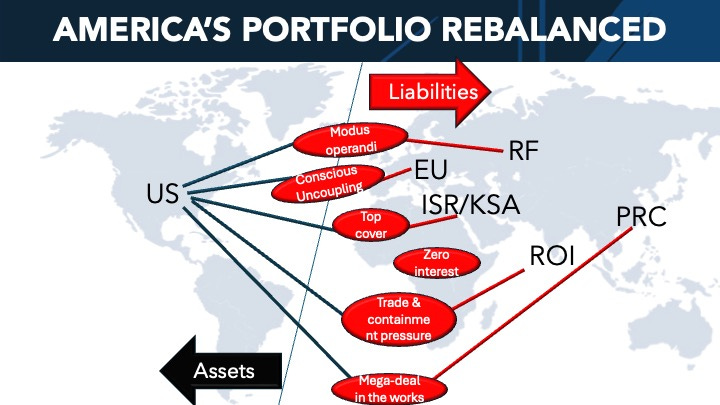

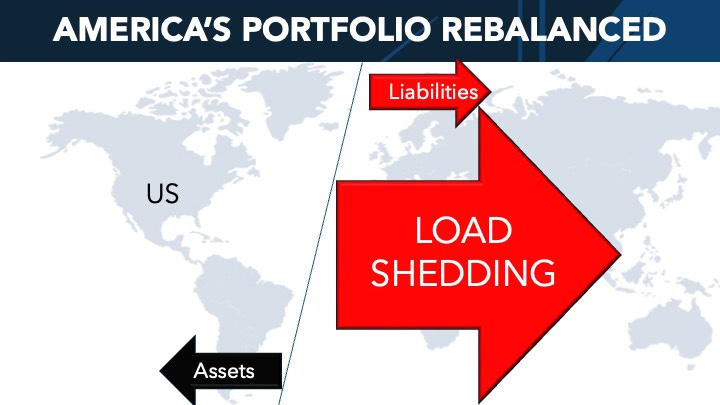
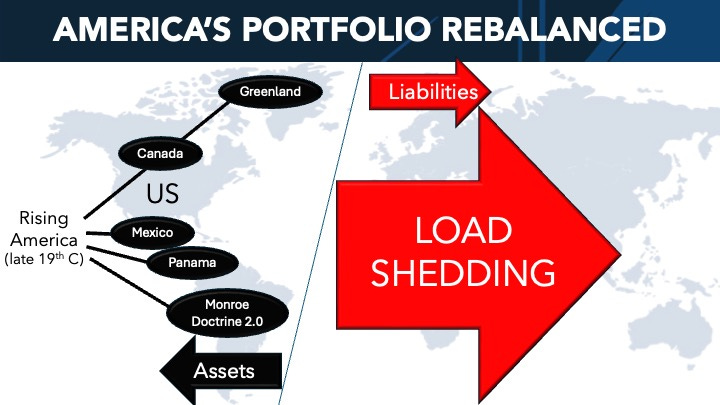
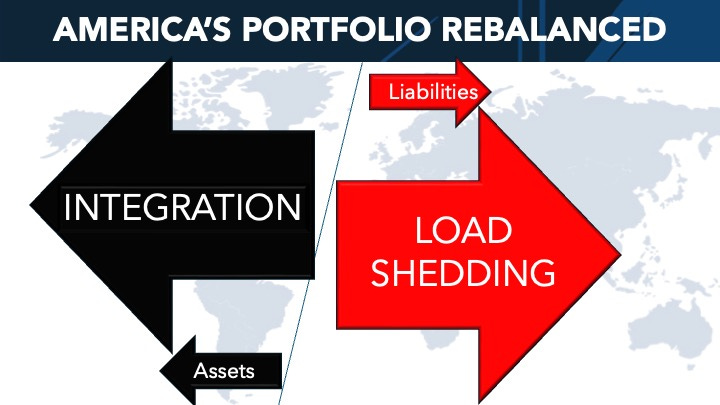




The only flaw I see is around the American consumer. I think that while the other areas / competitors will have a sphere of influence. They all will want to “sell” to the American market, because if the number of customers and general wealth.
Russia, Europe, China/India, and Africa either have raw materials or manufacturing capacity…they don’t have domestic markets big enough to take/buy/consume the finished products at a volume and price point that generates wealth for them. Yes some individuals get ‘rich’…but they are the outliers.
Until those areas increase their ‘middle’ class to consume what they produce, they will need the US Market.
Because of that, the strategic balance you outlined (which I believe is the correct course of action), cannot happen.